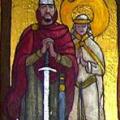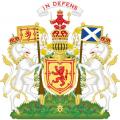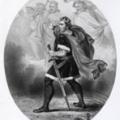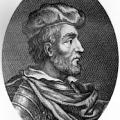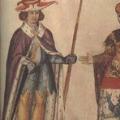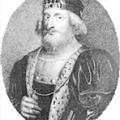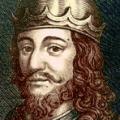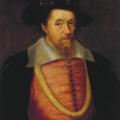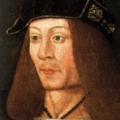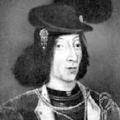Categories
Most Liked
Posted on July 17, 2013
by Amanda Moffet
by Amanda Moffet
Posted on May 12, 2013
by Chas Mac Donald
by Chas Mac Donald
Posted on August 29, 2013
by Amanda Moffet
by Amanda Moffet
Posted on February 7, 2013 by Donald | 1 views | comments
Máel Coluim mac Donnchada (Malcolm III) was King of Scots. He was the eldest son of Donnchad mac Crínáin. While often known as Malcolm Canmore, the earliest epithet applied to him is Long-Neck. It appears that the real Malcolm Canmore was this Máel Coluim's great-grandson Malcolm IV.
Máel Coluim'...
Posted on February 7, 2013 by Donald | 0 views | comments
Lulach was King of Scots between 1057 and 1058.
He appears to have been a weak king, and was indeed known as Lulach the Simple or Lulach the Fool. He does, however, have the distinction of being the first king of Scotland of whom there are coronation details available. He was crowned in August 10...
Posted on February 7, 2013 by Donald | 2 views | comments
Mac Bethad mac Findláich, known in English as Macbeth was King of Scots (or of Alba) from 1040 until his death. He is best known as the subject of William Shakespeare's tragedy Macbeth and the many works it has inspired, although the play itself is of limited historical accuracy.
Posted on February 7, 2013 by Donald | 1 views | comments
Donnchad mac Crínáin (Duncan) was king of Alba. He was son of Crínán, hereditary lay abbot of Dunkeld, and Bethóc, daughter of king Máel Coluim mac Cináeda.
Unlike the "King Duncan" of Shakespeare's Macbeth, the historical Donnchad appears to have been a young man. He followed his grandfather Máe...
Posted on February 7, 2013 by Donald | 1 views | comments
John, King of Scots is usually known as John Balliol or, correctly, John de Balliol. He was born in 1248, the son of Dervorguilla of Galloway and John, 5th Baron de Balliol, Lord of Barnard Castle and founder of Balliol College in the University of Oxford, one of the first colleges founded in Oxfo...
Posted on February 7, 2013 by Donald | 2 views | comments
David II, son of King Robert the Bruce by his second wife, Elizabeth de Burgh (d. 1327), was born at Dunfermline Palace, Fife. He was married on 17 July 1328 to Joan of the Tower, daughter of Edward II of England and Isabella of France.
.
David became king of Scotland upon the death of his father ...
Posted on February 7, 2013 by Donald | 14 views | comments
Robert I, (Roibert a Briuis in mediaeval Gaelic, Raibeart Bruis in modern Scottish Gaelic and Robert de Brus or Robert de Bruys in Norman French), usually known in modern English today as Robert the Bruce, was King of Scotland (1306 – 1329).
Although his paternal ancestors were of Scoto-Norman he...
Posted on February 7, 2013 by Donald | 3 views | comments
James VI and I was King of Scots, King of England, and King of Ireland and was the first to style himself King of Great Britain. He ruled in Scotland as James VI from 24 July 1567. Then from the 'Union of the Crowns', in England and Ireland as James I, from 24 March 1603 until his death. He was t...
Posted on February 7, 2013 by Donald | 8 views | comments
Although the Stuart family had gained the Scottish throne through Marjory (daughter of Robert the Bruce), Mary became Queen only because all male alternatives had been exhausted.
Princess Mary Stuart was born at Linlithgow Palace, Linlithgow, West Lothian, Scotland, on December 7 or December 8, 1...
Posted on February 7, 2013 by Donald | 8 views | comments
The son of King James IV of Scotland, he was born in 1512, at Linlithgow Palace, West Lothian, and was still an infant when his father was killed at the Battle of Flodden Field on September 9, 1513. He was crowned in the Chapel Royal at Stirling Castle on September 21, 1513.
During his childhood,...
Posted on February 7, 2013 by Donald | 6 views | comments
The son of King James III and Margaret of Denmark, he was probably born in Stirling Castle. When his father was killed at the Battle of Sauchieburn on June 11, 1488 the fifteen-year-old James took the throne and was crowned at Scone, Perthshire on June 24. The rebels who had gathered at Sauchiebur...
Posted on February 7, 2013 by Donald | 7 views | comments
James III of Scotland was the son of James II and Mary of Gueldres. James was an unpopular and ineffective monarch owing to an unwillingness to administer justice fairly, a policy of pursuing alliance with the Kingdom of England, and a disastrous relationship with nearly all his extended family.
...
Featured Articles
Most Discussed
Posted on July 16, 2013
by Amanda Moffet
by Amanda Moffet
Posted on February 6, 2013
by Donald
by Donald
Posted on July 17, 2013
by Amanda Moffet
by Amanda Moffet


 View More
View More View Less
View Less